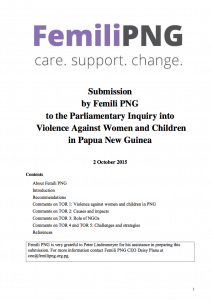 In October 2015, Femili PNG made a detailed submission to the parliamentary inquiry into violence against women and children in Papua New Guinea.
In October 2015, Femili PNG made a detailed submission to the parliamentary inquiry into violence against women and children in Papua New Guinea.
Femili PNG’s submission makes a number of important recommendations, based on its work in Lae supporting survivors of family and sexual violence.
Recommendations include:
- Violence against women and children (VAWC) must be recognised as a cause of serious physical and psychological harm to all Papua New Guineans, and as an impediment to improved economic growth and social development. Better prevention of VAWC and support for survivors of violence should be seen as a key investment in the country’s future prosperity and well-being. We recommend that the Prime Minister invite all Parliamentarians to make a joint statement condemning VAWC and committing to address this as a major social and development problem.
- As intimate partner violence is the most common form of violence that affects women in PNG, and due to the burden it imposes on those women and their children, the response to such violence should be prioritised across government and take a whole of family approach.
- In view of the particular vulnerabilities of children to the effects of violence, and the benefits to be obtained by interrupting the intergenerational transmission of violence, we recommend that the Government invest in a detailed implementation plan to ensure that the training and resources required to implement the Lukatim Pikinini (Child Welfare) Act are available at the level of service delivery.
- This inquiry should recognise the key role played by NGOs in providing services to survivors of VAWC, and support the coordinating role of FSVAC.
- The Government should develop a targeted plan to systematically address VAWC, including consideration of:
- The provision of additional support services for survivors.
- More effective responses by the police and court system.
- Increased provision of skills-based training to all service providers who come in contact with survivors and perpetrators of VAWC.
- Cultural leadership that promotes action against VAWC, including within service agencies.
You can download the full submission here [pdf].


